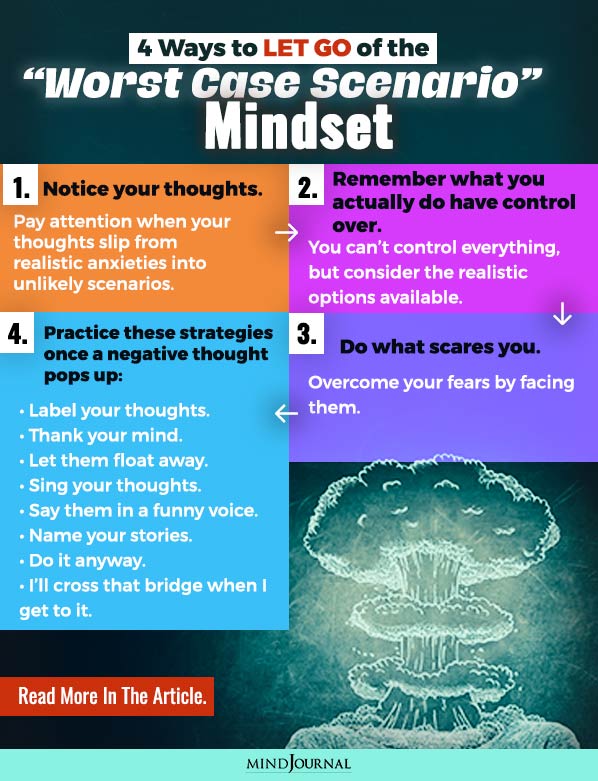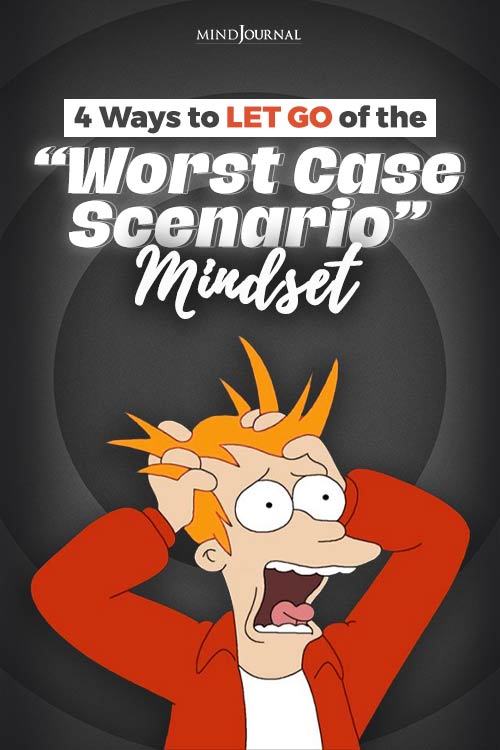Life is unpredictable, and with everything that is going on, you must be thinking about preparing for the worst case scenario more than you would like. Although it’s important to be prepared for anything, make sure you eliminate negative thinking today!
Hi there!
I hope you’re doing well. It’s hard to believe that we’re halfway through a year that has completely redefined our lives.
And if you’re someone who is struggling with anxiety, I’m sure this period of time has brought about a few too many “worse case scenario” thoughts.
Think about it: How often does a sudden negative thought increase into a worst case scenario? How often does a thought turn into an absolute catastrophe in your mind? For instance, a dry cough turns into bronchitis. A flight to see a friend turns into the idea of your plane crashing. A canceled date turns into you dying alone. A global pandemic turns into an almost guarantee in your mind, that you and those you love will be affected by the virus.
It’s normal to have negative thoughts, no matter how extreme they might be at times. It’s part of our evolution to constantly scan our environment, looking for problems to fix. The problem is not so much that we have negative thoughts, rather, the issues arise when we believe our thoughts are true, and when they turn into a worst case scenario that makes us feel even more anxious.
Think about an article in a tabloid about the latest celebrity. Most of us know it’s an exaggeration or fabrication. We don’t believe that the article is totally true, and we don’t change our lives around those articles. The negative thoughts in our minds are just like those tabloid stories. The problem is that if we don’t step back to gain a more truthful perspective, we may let worst case scenarios run our lives.
Below are techniques you can practice before letting negative thinking turn into worst case scenarios:
4 Ways to Let Go of the “Worst Case Scenario” Mindset

1. Notice your thoughts.
Pay attention to when your thoughts slip from realistic anxieties into unusual or unlikely scenarios. Notice the patterns without judgment. We tend to judge ourselves when our thinking becomes catastrophic, so notice if you’re judging yourself being that this amplifies your anxiety.
Related: How Rigid Thinking And Rumination Undermines Your Health And Life
2. Remember what you actually do have control over.
You can’t control everything, but consider the realistic options available to you at the moment. If you’re scared of flying, research the statistics and learn about flying. Remind yourself that this practice has existed for over a century and that, statistically, you’re safer in a plane than in your car.

3. Do what scares you.
The single most effective way to overcome your fears is to face them. Famous psychologist Carl Jung observed that that which you resist persists.
For example, if you have a fear of flying, try your best to book a flight. If you are scared to face a serious issue in your marriage, face your partner. Because if there is a serious problem, then at least you’ll know what to work on, instead of worrying, ruminating and feeling stuck.
Read Mindfulness And Emotional Intelligence
4. Practice strategies once a negative thought pops up.
Thankfully there are strategies we can practice to calm our anxiety and tame our negative thoughts which I list below.
- Label your thoughts. Instead of saying, “I’m stupid,” say, “I’m having the thought that I’m stupid.” Instead of saying, “I’m going to fail this test,” say “I’m having the thought that I’m going to fail this test.” The difference may seem small; however, it can help you gain the perspective that you are not your thoughts.
- Thank your mind. If you’re having anxious thoughts such as, “I hope this plane doesn’t crash,” say, “Thank you, mind, for trying to keep me safe. But there’s nothing you really need to do right now. I’ve got it covered.”
- Let them float away. This one involves imagery. Imagine placing each negative thought in your mind on a leaf, and watch it float down a stream. When you have another thought, as you will, put it on another leaf and watch it float on by.
- Sing your thoughts. Try singing your thoughts to the tune of the alphabet song or Row, Row, Row Your Boat. Your thoughts will certainly sound absurd this way, which is the whole point.
- Say them in a funny voice. Try saying your thoughts in a funny voice, maybe imitating a cartoon character.
- Name your stories. Often, our thoughts are repetitive and involve the same stories. When a thought like, “You’re going to embarrass yourself” comes up, say, “Oh, here’s my I’m an embarrassing loser story,” and then just let it go.
- Do it anyway. Perhaps the most important tip is to remember that you can have a thought and perform any kind of behavior at the same time. If it’s something you care about, it’s worth it to let the thoughts simply be. You don’t have to do anything about them. Remember, you can function even when you’re anxious.
- I’ll cross that bridge when I get to it. When the what-ifs are bombarding you with tales of future disaster, it’s helpful to know that you don’t need to solve anything right now. When you recognize that you’re worried about a future event, think to yourself, “I’ll cross that bridge when I get to it.”
Related: 6 Signs To Tell If There’s A Negative Energy In Your Space And 6 Ways To Clear It
Written By Ilene Strauss Cohen
Originally Appeared On Doctor Ilene
Being aware and careful about your future is a smart thing to do, but if you are constantly feeding yourself negative thoughts, and making yourself anxious, then that’s a big problem. If you give in to the worst-case scenario mindset all the time, your anxiety will never leave you, and you will feel miserable and scared all the time. Now, is that really a way to live life?










Leave a Reply
You must be logged in to post a comment.